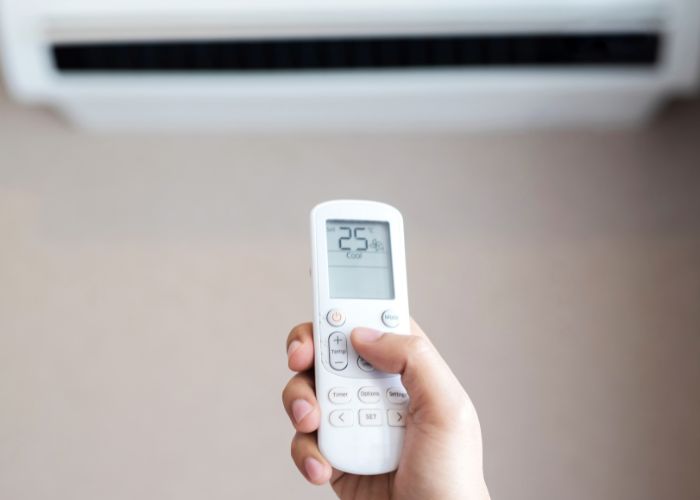MADRID – Less air conditioning and heating, dark shop windows and a call for more working from home are some measures that Spain wants to use to save energy. On Monday, the Council of Ministers approved a package of urgent measures.
This is in response to the rising price of electricity and fears that Russia will interrupt the supply of gas to Europe because of the war. All agreed measures are aimed at improving efficiency and to save energy in companies, hotels and transport, but also the public sector.
The new regulations apply from publication in the Official Gazette. This Royal Decree also includes fines of up to €60,000 for minor violations, and up to €6 million for serious violations. Furthermore, fines of up to €100 million may be issued for very serious violations.
These are the main measures:
Lights out after 10 pm in shop windows and public buildings.
The government gives companies seven days to switch off shop windows and outdoor lights after 10 pm. In case of non-compliance, the sanctions regime would be applied. This rule will not affect the Christmas lights. The ornamental lighting of monuments is also exempt, provided it does not concern empty buildings at night.
Temperature restrictions, thermometers and closed doors.
The decree stipulates that until November 2023, the air conditioning in administrative buildings, commercial or cultural spaces, the common areas of hotels, cinemas or train and bus stations may not be lower than 27 degrees. In winter, the heating should not be higher than 19 degrees.
Likewise, thermometers should be installed that make it easy to check compliance, and information posters showing the improvements made. In the same vein, buildings should have a system in place by September 30. This should include keeping the doors closed to avoid wasting energy when the heating or cooling systems are in operation.
The buildings that are required to carry out an energy efficiency inspection must check the boilers and thermal installations before December this year if the latter was before January 2021.
Exceptions to the air conditioning and heating limit.
The Royal Decree provides for exceptions for air conditioning and heating limit in hospitals, training centres, hairdressers, gyms and laundries. Public transport itself (plane, train or ship) is also exempted. This is even if there is an obligation to regulate the temperature at the stations.
It will not be required to apply the maximum and minimum in those workplaces where it is necessary to maintain “adequate climatic conditions” for employees, such as restaurant kitchens.
In certain establishments, there will be an exception when “occupancy peaks” are recorded. Establishments justifying this with “industry specificities” will also be exempt. Think of areas in supermarkets where it is necessary to maintain the cold chain.
In hotels, the measure only affects the common areas, but not the rooms. Therefore, the guest has the freedom to regulate the temperature.
More working from home.
The new regulation recommends strengthening the remote working modality. This will reduce the impact of the energy produced by commuting and the energy consumption in the work centre itself. In the case of the public sector, employees can work remotely three days a week and two days in the workplace.
Promotion of public transport.
The government wants to promote the use of public transport and other mobility measures. This measure coincides with the bonus on travel passes for Cercanías, Rodalies and Renfe medium-distance trains. These modes of transport are free from September 1 to December 31, 2022.
The price of tickets for Avant services will also be reduced to 50%. And, furthermore, new subscriptions for fast commercial services will be added.
Promoting self-consumption and renewable energy sources.
In the case of self-consumption, the modality change is accepted every four months -without surpluses, with surpluses, and a new mechanism is established if a new installation entitled to compensation for surpluses needs more than two months to be regularised.
The new standard also includes measures to replace fossil fuels with renewable energy sources. This includes streamlining electrical network and infrastructure procedures and reducing requirements, one of the industry’s key demands. In addition, it facilitates the injection of renewable gases into the gas pipeline network and promotes storage and self-consumption.
Support for companies in the tertiary sector.
To guide companies in their savings and increase energy efficiency, the ministry published a new helpline for the tertiary sector on Tuesday with €100 million from the National Fund for Energy Efficiency (FNEE). This is valid from December 2024.
It is also expanding funding for the industry’s energy efficiency program, in effect since 2019. Furthermore, it is proposing to support innovative hybrid energy storage projects with renewable generation.
A preview of the emergency plan for Brussels
The austerity plan comes a week after EU countries agreed to voluntarily cut gas consumption by up to 15%, with exceptions such as Portugal or Spain, which are considered ‘energy islands’ due to their decoupling from the European energy market.
In the case of Spain, which has made itself available to the EU to re-export gas to neighbouring countries, the target is to save energy consumption by 7% between 1 August 2022 and 31 March 2023. The measures presented this Monday are a preview of the broader contingency plan that the government will present to Brussels before September.


